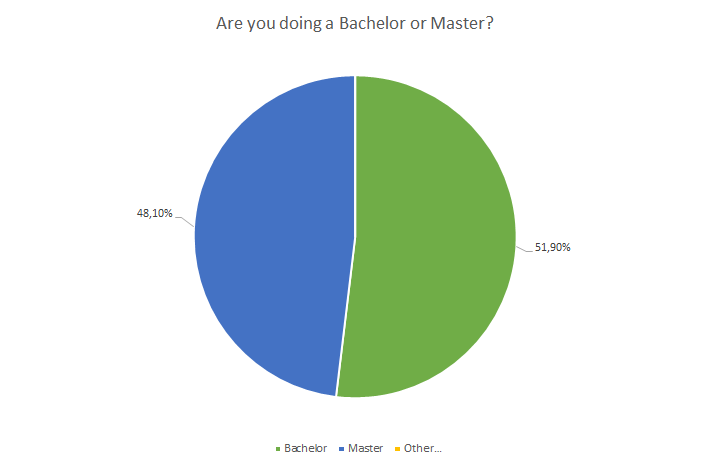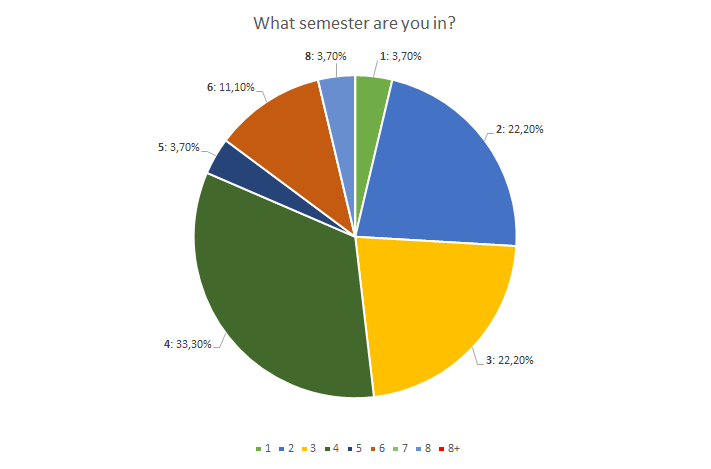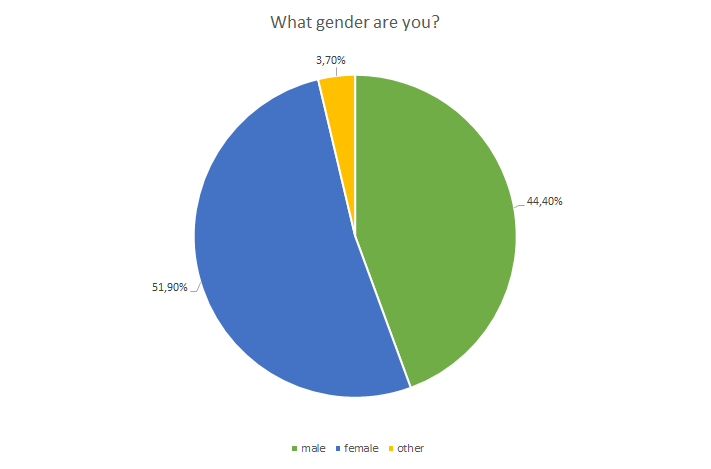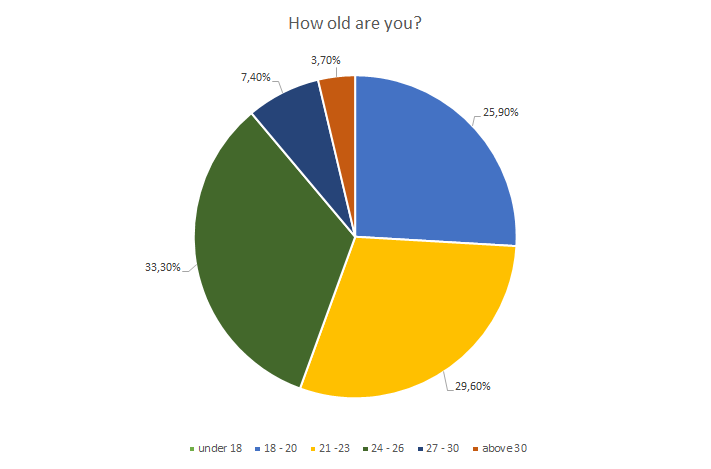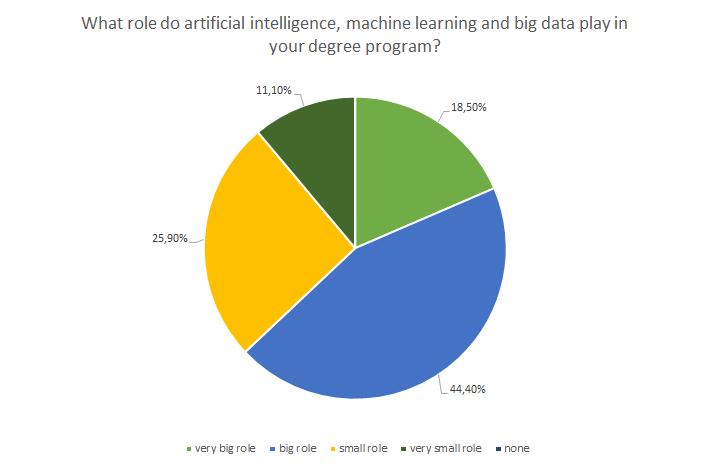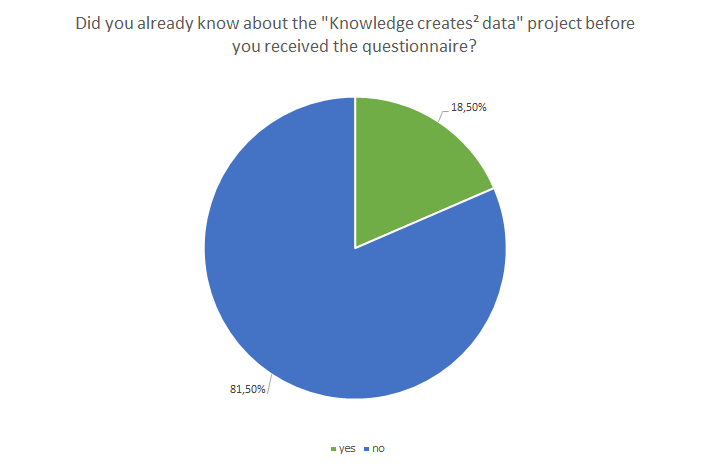
In order to investigate how students of the University of Regensburg think about Artificial Intelligence, Machine Learning and Big Data and how they assess the quality of the lectures/seminars offered to these topics at the university, a survey was carried out among the current students (summer semester 2020 & winter semester 20/21).
Here questions were asked about the lectures/seminars attended, their quality, the knowledge imparted and also about the basic attitude to the topics examined.
The interview provided the following results:
Here questions were asked about the lectures/seminars attended, their quality, the knowledge imparted and also about the basic attitude to the topics examined.
The interview provided the following results:
Mentioned courses:
- Information science
- Media informatics
- Public history
- Digital humanities
- Media studies
- Psychology
Almost all respondents stated that they had already attended events on the topics mentioned. Mentioned events / topics:
- Machine learning
- Web and Data Science
- Human-computer interaction
- Acquisition, preprocessing and analysis of sensor data
- Information systems
- Digitization and digital society
- Information retrieval
- Natural Language Engineering
- Genomic and Bioinformatics
- Advanced Topics of Optimization Algorithms
- Digital Humanities
- Representation of certain and uncertain knowledge
- Computation Intelligence
- Information linguistics
- Interaction techniques and technologies
- Database systems
- Internet of Things
- “Especially machine learning I and II in any case. Conveys all the important basic knowledge in the field of artificial intelligence, you learn the underlying mathematics and how to apply the methods.”
- “In theory, I would recommend choosing the main focus of the mandatory events, but it is then also helpful to take courses from the IW or something else in advance that introduces the topic and that you try something more general, since the first one larger project in the direction of machine learning has now been implemented without much preparatory work and the system to be built was already a more advanced one, for which there were hardly any good tutorials and you felt a bit lost. “
- “Yes, definitely. All the other courses go far too little into detail and convey machine learning content anything but ‘hands-on’.”
- “I would recommend DDG I, as it provides a good rough overview of what Machine Learning, AI, Big Data or similar play a role in everyday life and what makes these things possible.”
- “Good overview”
- “Would rather not recommend because there is hardly any concrete application (e.g. with examples, sample solutions, etc.)”
- “Yes, better understanding of machine learning in detail and in business / society”
- “Yes, because the topics are interesting.”
- “Yes, because you get a good overview of the technologies mentioned without too many technical details.”
- “Yes, I find the topic very interesting.”
- “Natural Language Engineering only deals with AI, Machine Learning only additionally – these topics are repeatedly addressed, but mostly only of a theoretical and superficial nature. But still an extremely valuable course, because it provides important basic requirements for these technologies.”
- “Yes, because machine learning is playing an increasingly important role in many areas.”
- “Yes, it was very interesting.”
- “For me it was too complex and not what I want to do later, so rather no.”
- “No: very theoretical, inconceivable without a basic course beforehand”
- “Yes, because these topics are currently very important.”
- “Yes, because especially in relation to language and interaction through gestures, e.g. Machine learning can be very fascinating.”
- “At first it is difficult to fully understand the complex mathematical concepts, but over time you notice similarities, which makes it easier to deal with them.”
- “It is rather difficult to deal with, at least in the courses in which it came up, because there was no corresponding course in which you had to practically implement exactly what was the subject of one of the later courses and you just had to work everything out by yourself. There were hardly any tutorials or clues for the specific Machine Learning area, so it was very difficult to get into the topic from scratch.”
- “Easy”
- “Rather easy”
- “So so, it is actually easy for me to understand the basic principle, when it goes deeper, I sometimes find it difficult.”
- “Rather difficult. I like to understand things from the ground up, and with Machine Learning it is often difficult to understand exactly how the result comes about.”
- “The topics are very mathematical, require a lot of training and even more time to analyze the results. Since this field is very extensive, good basic knowledge is absolutely important.”
- “Difficult, very complex topic. In particular, understanding Machine Learning itself, as it is based on mathematical principles and complex algorithms are very abstract.”
- “Rather difficult”
- “At the beginning it seems rather difficult, especially with the math that is hidden behind it. But if you use Tensorflow / Keras as a black box, for example, it is manageable.”
- “It is very complex”
- “Partly complicated, but interesting”
- “It depends on how the professor explains the topic, sometimes easy and clear examples are missing.”
- “It wasn’t covered very intensively, but always only been a small part, therefore rather easy.”
- “Rather difficult because I often lack the background knowledge.”
- “Difficult”
- “Some topics are easy, but especially AI is a very large topic that is not always easy.”
- “Definitely offer more events yourself at the chair (currently mainly in the field of physics); make voluntary offers from other faculties more visible and easier to bring in.”
- “It may be useful to attend a basic course for the required mathematical knowledge before the Machine Learning course.”
- “More events in which the topics are taken up even more.”
- “I can’t estimate yet, because the topic has only been covered additionally, but I would say that several more events are good. Just with regard to life after university: the more you have dealt with the topic, the easier is a professional entry. And at the moment this is an enormously rapidly growing research area. So the material does not run out.”
- “An introduction to machine learning itself would be helpful, because as far as I know, for AI is already offered an introduction in a certain way, but when I took the courses, they had been restructured and the lectures were about the topics, but in practice you haven’t done that much. It would also be helpful to focus on one integration of Machine Learning, e.g. one course in which you build such a system with Python as a basis and then later also in Tensorflow or PyTorch or introduce other possibilities.”
- “A lot more events are necessary! We often talk about AI but it feels like nobody teaches you. Something like Jupyter Notebook seems to be alien to most professors.”
- “More reflection on implications and benefits for realities of life”
- “Analogous to other events, I would have expected concrete exercises that go from easy to difficult and not a fat theory block, we had probably one session to introduce the software and then we were expect to teach ourselves the rest.”
- “Practical examples to try out by yourself would certainly help with understanding.”
- “There should be lectures on the basics of neural networks, especially how to implement simple examples by yourself.”
- “I think more events on these topics would make perfect sense.”
- “Easy and clear examples and yes more events would be good, too.”
- “In Computational Intelligence, an exercise unit where Tensorflor / Keras Deep Neural Networks are implemented would still be desirable.”
- “More events needed.”
- “There should be specific compulsory optional courses on the subject, since up to now only words have been used now and then, but it was not a core topic.”
- “A more fundamental event that introduces in this area could be useful, it was applied directly in my courses.”
- “More would be better”
- “The events are not designed directly for Machine Learning. A dedicated event with a practical part would certainly make a lot of sense. “
- “Maybe more practice with small tasks to better understand the topic.”
- “Should be included in the basic studies.”
- “I don’t think I would visit because I don’t want to go into computer science.”
- “More advertising for the events”
- “There are none.”
- “If more were offered”
- “Yes, because it is playing an increasingly important role in a wide variety of sectors. Almost every area nowadays uses Machine Learning or Big Data approaches in some form.”
- “Yes, I think. It permeates everyday life for me, also from a student perspective: As I said, I had the feeling of having to apply Machine Learning skills even though nobody taught me. The quality of the projects also suffers as a result.”
- “Yes, because it is a very important topic for the future – everyone should have at least a little idea of how the voice assistant on their mobile phone or something similar works.”
- “Yes, I think it is important, because it is important that these terms are not just thrown around as catchphrases, but that we understand what is behind them and, if possible, also gain practical experience with them.”
- “Yes, I think that sooner or later AI etc. will find its way into every area of our life and therefore one should have at least a vague basic understanding of it.”
- “It depends. I think that this should be addressed in many areas, because it is ubiquitous in everyday life, even if you may not even notice it. Nevertheless, not all students need it for their later professional life.”
- “This AI summer should be used to profit from the fruits of summer in the next AI winter.”
- “Yes, because it is very present especially nowadays through all the advertising algorithms.”
- “Yes, this is a future issue.”
- “I think it depends on what you are studying. In computer science courses, definitely.”
- “It depends on what focus you have as a student, in other words, in which direction you would like to continue your education. The Master IW leaves some freedom that does not necessarily have to be filled with the field of AI, etc. Many students also choose IW, because they particularly value the mathematics and IT requirements that don’t have to be deepened.”
- “Yes, because these topics are increasingly influencing our everyday lives (e.g. Cambridge Analytica, targeted advertising). In my opinion, it is important that students have a little insight into how these technologies work and are therefore more aware of how your data will be processed.”
- “Yes, as it is becoming more and more important.”
- “In certain courses of study, it is definitely interesting to deal with the topics, precisely, because it is the business of students who use the internet a lot. You can also look at the topics from different points of view (ethically, what opportunities it brings, the dangers, the advantages, for whom it can still be useful). “
- “Yes, as it will in all likelihood be a big part of our future.”
- “Yes, because I think it will be important in many professions.”
- “Yes, since that’s just the future.”
- “Yes, because they are very up-to-date and, especially important topics.”
- “Yes, future technologies in academia and business will often be built on the basis of this.”
- “Only if you have something to do with the subject.”
- “Yes, because it will make up a large part of further scientific research in the future and can affect each of us.”
- “When studying media informatics, I think it’s important to cover the topics as they are relevant.”
- “I think it is important to at least know the terms as these are becoming increasingly important in the future.”
- “It is already part of our everyday life and is expected to continue to grow.”
- “Yes, because these topics are becoming more and more important and are developing at breakneck speed.”
- “Yes, because it is becoming more and more important – not only in business, but also in science, so that it can be handled responsibly.”
- “I think I have already given my opinion on this in detail. The best AI courses are made by other faculties (so far)”
